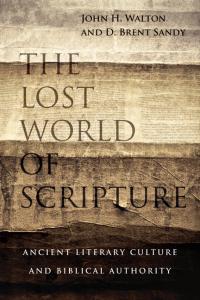 We are reaching the end of our walk through The Lost World of Scripture by John Walton and D. Brent Sandy. After describing why inerrancy is an important term – although really inadequate to the task “its limitations have been exposed as it has been put to the test in a variety of ways” (p. 283) – John and Brent move on to describe an approach that they feel better serves our purposes. The first thing to note is that the term inerrancy grew in importance in response to skeptical claims criticizing both Scripture and the Christian faith. This is probably not the best reason to formulate our doctrine. “Our best doctrinal formulation should not be constructed to convince skeptics but to truly describe our actual beliefs. (p. 284)” It is also true that our best doctrinal formulation should not be described to erect fences around scripture to “protect” believers.
We are reaching the end of our walk through The Lost World of Scripture by John Walton and D. Brent Sandy. After describing why inerrancy is an important term – although really inadequate to the task “its limitations have been exposed as it has been put to the test in a variety of ways” (p. 283) – John and Brent move on to describe an approach that they feel better serves our purposes. The first thing to note is that the term inerrancy grew in importance in response to skeptical claims criticizing both Scripture and the Christian faith. This is probably not the best reason to formulate our doctrine. “Our best doctrinal formulation should not be constructed to convince skeptics but to truly describe our actual beliefs. (p. 284)” It is also true that our best doctrinal formulation should not be described to erect fences around scripture to “protect” believers.
So what do John and Brent suggest? They suggest that we should be competent readers, ethical readers, and virtuous readers. We can look at each of these terms.
Competent readers seek to be faithful to the original meaning of the text. Among other things this means that we should seek out careful and faithful scholars who translate the language and the ancient context of the text for us. Bad translations and interpretations have a ripple effect and can result in errant conclusions based on these misinterpretations of language or culture. Competent reading will also consider genre and purpose of the text. Skeptics point to discrepancies and suggest these undermine the authority of Scripture while believers twist the text to remove such discrepancies. Many of the supposed errors or inconsistencies in Scripture disappear if we are competent readers of the context and genre. “We diminish the Bible’s authority if we claim the cover of inerrancy for our incompetence or ignorance.” (p. 285)
Ethical readers … to be faithful to the text we must also resist the temptation to twist the text to match our expectation. As ethical readers we should seek to understand the intended message of the text – to understand what the text is affirming. It is unethical to read Scripture through a modern lens to serve our vested interests. From a skeptical side an unethical reading could include condemning the Old Testament or Paul for not living up to modern standards (e.g. it is abhorrent because it does not outright condemn slavery). From a perspective of belief an example of “unethical” reading could include an approach that views Scripture as containing hidden codes revealing either scientifically sophisticated information or mysterious truths. John Walton has emphasized this in all his books and commentaries – Scripture effectively communicated God’s message into its original culture and context.
Virtuous readers … “The Bible is offering an encounter with God, and it expects the reader to be transformed as a result.” (p. 287) This means that we submit to the teaching of the text … and we read and study it constantly and completely (not just the parts we like best).
Of course the Holy Spirit plays an important role here – in the original events and records, in the God-Spiritedness (i.e. God breathed nature) of the canon preserved for us, and in the lives and understanding of the reader. We believe that the Bible conveys/preserves God’s revelation of himself and we thus strive (or should strive) to be competent, ethical, and virtuous readers of the text.
John and Brent also emphasize that we need to focus on the Bible’s authority in its intended message. “Scripture contains all sorts of incidentals that carry no authority, though they are true.” We can realize that Esther was courageous – but the text is not teaching us to be courageous. This is not the intended authoritative message of the book. John and Brent stop here in this chapter, but we can go further and note that Scripture also contains incidentals that carry no authority and are not true. For example, Genesis 1 refers to a vault above the earth and other passages to storehouses or a flat earth. These references (as John has often pointed out) are incidental to the message and carry no authority. The author of Genesis 1 is teaching of God’s creative majesty not providing an authoritative cosmology.
From a confessional perspective (i.e. as one who confesses belief in God and Christ) what is the significance of Scripture?
How do we as competent, ethical, and virtuous readers approach the text?
If you wish to contact me directly, you may do so at rjs4mail[at]att.net.
If interested you can subscribe to a full text feed of my posts at Musings on Science and Theology.











